Poker has a vocabulary all its own. There are many words and phrases in our common lexicon that came from poker; and there are many words and phrases that come from our regular speech but that take on a special meaning in the poker world.
Knowledge is power.
It can only help for you to know, quickly and with certainty, the meaning of the many poker terms and phrases. Below is a list of those words and expressions.
This is an alphabetical list of poker words and phrases. It is surely not complete, as no list of poker words and phrases can be.
If you have any words, phrases, or expressions you’ve heard that are not on the list, we are always interested in knowing them.
Let's get started!
Poker Words and Terms from A to Z
Below, you can find the list, sorted alphabetically:
A:
- ABC Poker: A poker playing style that is mechanical, predictable, and “by-the-book” to a fault.
- Ace-High: A hand with no pair and an Ace, of different suits, and without five consecutive cards.
- Aces Cracked: Aces beaten. There is often a promotion that gives a prize, $100 or so, to a player who has their Aces cracked.
- Aces-up: Two pair headed Cby a pair of Aces. The best two pair.
- Act: To take a poker action: (check, call, bet, raise, fold).
- Action: 1. The condition in a poker game of having to act.
“The action is on you.” 2. The quality in a poker game of having lots of betting and raising. “I find that Omaha has a lot more action than hold’em.” - Active Players: Players still in a hand.
- Add-On: An additional stack of chips that may be purchased at the end of the early phase of a tournament. Not to be confused with “Re-buy”
- Advertise: To show that you sometimes bluff, by exposing a bluffing hand.
- Age: The blind. The player starting action to the left of the button. Now obsolete.
- Aggressive: A style of play characterized by betting and raising. The opposite of passive.
- Ahead: The condition of being the favorite. “His Aces were way ahead of my QJ off, but I flopped good and outdrew him.”
- All-In: noun: The circumstance of having all your chips in the pot. “If Susu calls she will be all-in.” Adjective: A type of bet that commits all of one’s chips to the pot. An all-in bet.
- Angle Shooting: Actions that may not technically be against the rules, but that are unethical or go against the spirit of the game. “He’s angle-shooting by saying that he bet blind, after he looked at his cards. What a jerk!”
- Ante: 1. Noun: An amount of money a player must contribute to the pot before receiving a hand. 2. Verb: The act of putting in an ante.
B:
- Babe: A small card, especially in a low hand. “He had three babes to start.”
- Baby: A small card, especially in a low hand. See “babe”.
- Back-door Draw: A draw that requires two cards. Three cards to a flush or a straight is a back-door draw.
- Backdoor: Verb: To make a back-door draw, typically by hitting both the turn and the river to make your hand. “That lucky guy. He went runner-runner spade and backdoored the nut flush!”
- Backing: Financial support in a tournament in exchange for a percentage of money won. A backer is someone who provides that financial support.
- Bad Beat: 1. A situation where a hand that is a big favorite is out drawn. “He suffered a really bad beat when his set of Kings got run down by a guy who started with 8 5 and caught a straight on the river.” 2. A shortened version of “bad beat jackpot”. “His quad Aces lost to a straight flush, but he won the bad beat worth $150,000!”
- Bad: The condition of having the worst of it in a bet. “I admit it. I got it in bad. But I got lucky and won.”
- Badugi: A variety of poker, with four cards per player without the standard ranking of poker hands. Instead, the highest value hand, known as a badugi, consists of four cards of different suits. Among badugis, the lowest badugi is the better hand.
- Balance: Creating an impression that is hard to put on a hand by playing different strength hands similarly.
- Bankroll: 1. Noun: Amount of money a player has set aside for poker. “You need a $10,000 bankroll for that $2/5 game.” 2. Verb: To provide funding to another player in exchange for a return of their winnings. “Big Lou is bankrolling that Bobby the Horse into the tournament.”
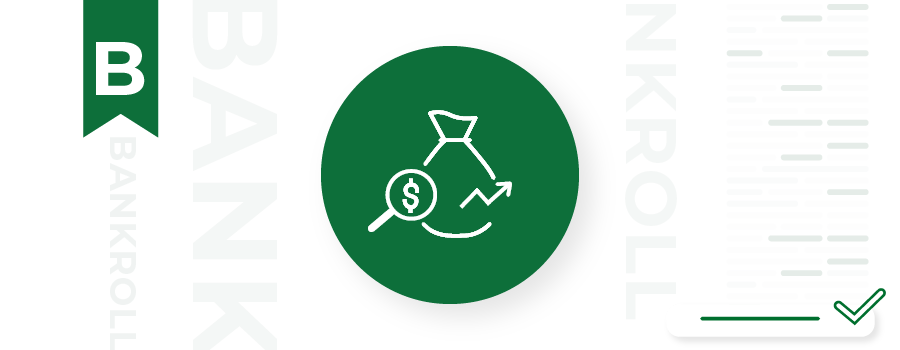
- Barrel: 1. Noun: Usually used to define a bluff that is continued from betting round to betting round. A “double barrel bluff” would be a bluff that is continued to a second betting round. A “triple barrel” would describe a bluff that continues on the river. 2. Verb: The act of making such a bluff. “He got caught barreling on the river, and lost his stack.”
- Behind: The condition of being the underdog. “He was behind against the Queens, with just his Jh 2h, but hit his flush on the turn and went on to win the hand.
- Belly Buster: An inside straight draw.
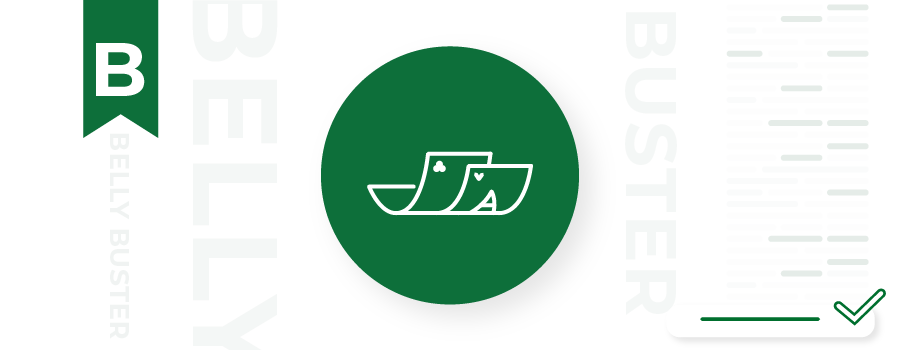
- Bet: 1. Noun: The wager in poker. He made a $50 bet on the turn. 2. The act of making such a wager. “He bet $50 on the turn.”
- Better to be Lucky Than Good: A self-deprecating expression, often said ironically when someone lucks out on the river.
- Betting on the Come: Making a bet with the expectation that you will hit your card on the next round or rounds of the deal. For example, if you bet on the flop with only a flush draw, hoping to hit your flush on the turn or river, you would be said to be “betting on the come”.
- Big Bet Poker: A poker game with a Pot Limit or No Limit structure.
- Big Bet: In a limit poker game, the larger of the two allowable bets, typically twice or nearly twice the size of the small beet. In limit hold’em and Omaha, the big bet starts on the turn. In stud game it starts on fifth street.
- Big Blind Special: A starting hand, in the big blind, especially a weak starting hand, that is greatly improved on the flop, especially when there is no raise. 7h4d with a flop of 774 would be an example of a big blind special.
- Big Blind: 1. Second mandatory bet, two to the left of the dealer button, usually twice or nearly twice the size of the first blind, known as the small blind. 2. The player in the seating position that posts the big blind.
- Big H: A home game, played like Omaha, with a board consisting of cards arrange like the letter H.
- Big O: An increasingly popular version of Omaha played with five hole cards instead of the standard four hole cards.
- Big Slick: A nickname for AK (suited or unsuited).
- Big: An adjective, derived from the lower of the two hole cards, that defines the strength of the higher card. AK, AQ, AJ, and AT would be defined as a Big Ace. “I only raise in early position with high pairs or a big Ace.”
- Blank: A card that does not help anyone’s hand.
- Blaze: A freak or non-standard poker hand of five face cards. Better than a flush but not as good as a full house.
- Bleed: To lose poker chips, especially over a series of hands. “He was chip leader, but he’s been bleeding chips for the past hour and now has the smallest stack.”
- Blind Bet: A bet made deliberately prematurely, before knowing the cards to be dealt on the next betting round, especially when done before the first two cards are dealt.
- Blind Off: To remove chips when an absent player is the blind.
- Blind Raise: A raise made without looking at hole cards, typically made after the big blind or straddle. Unlike a blind, a blind raise is not live, and cannot raise if it is called.
- Blind: 1. Noun: A forced bet required before any cards are dealt. In the standard hold’em game played today there are typically a small blind and a big blind, but games are also played with only one blind or with three. 2. Noun: The player in the blind. As in “blind off” or “blinded out”.
- Blinded Out: A player, typically a tournament player, who has had his chip stack diminished to zero, and is thereby out of the game.
- Blocker: A card in a player’s hand that would help an opponent’s hand. If my opponent is on a spade flush draw and I have a spade in my hand, it is said to be a blocker. See “card removal”.
- Blocking Bet: A small bet in earlier position meant to discourage a larger bet from someone in later position.
- Blue Chips: Historically, blue chips were the highest value chips in a tri-color chip set consisting of white, red, and blue. Hence, “blue chip stock” has come to mean the most valuable stock – the safest, most stable investment. Today, where blue chips are used, they are typically worth $10, and not nearly the highest value chip in a casino. Green chips are worth $25, Black chips $100.
- Bluff: 1. Noun: A bet meant to deceptively represent a stronger hand when having a weak hand. 2. Verb: The act of making a bluff.
- Bluff Catch: Successfully calling a bet, especially with a weak hand, with the belief that an opponent is bluffing with an even weaker hand.
- Bluff Catcher: 1. A hand that is only strong enough to beat a bluff. 2. A player who habitually calls opponents, believing they are bluffing.
- Board Texture: Whether the board appears to help drawing hands or not help drawing hands. Board texture is broadly described as “wet” or “dry”.
- Board: 1. The exposed cards in Hold’em or Omaha and other community card games. 2. The exposed cards of each player in 7-card Stud and its variants. 3. The sign that displays the names of the players waiting to play in a game.

- Boat: The shortened form of full-house (known also as a “full-boat”)
- Boated: To make a full-house. “He boated on the river, beating my flush.”
- Bomb Pot: An increasingly popular variant on a conventional hold’em or Omaha game, typically dealt once every dealer turn, with player participation optional, requiring participants to make an ante that is a multiple of the large blind. Once the antes are posted, the dealer deals players their down cards and the flop before there is any betting. This is often played with two boards, each of which is used to win half of the pot. This may be played with four or five hole cards, as PLO or Big O, or two cards as in hold’em.
- Boston Stud: A home game variation of Five Card Stud, with four community cards.
- Bot: Short for “robot”. A computer-generated player in an on-line poker game that plays automatically based on a program, sometimes with human assistance as well.
- Bottom Dealing: Dealing from the bottom of the deck. A form of cheating.
- Bottom Pair: A pair using the lowest ranked board card on the flop.
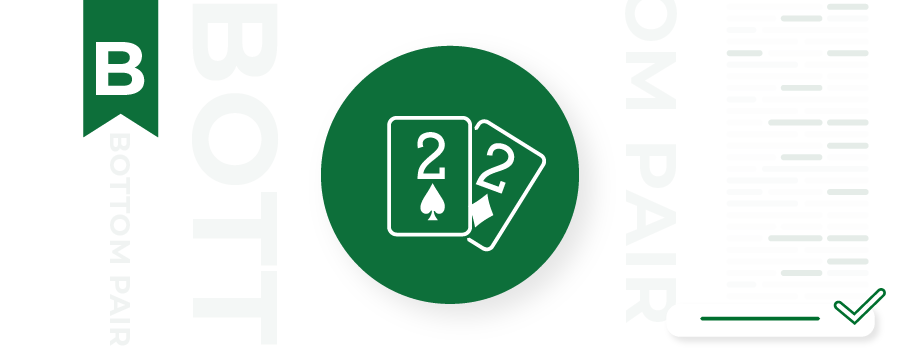
- Bottom Two: A hand that pairs the lower two cards of the board. With a board of Q76, a hand with 76 would be “bottom two”.
- Bounty: A reward for knocking out a player in a tournament. It is typically a cash-value chip purchased by each player upon entry into the tournament, given by the player who is knocked out to the player who knocks them out.
- Boxed Card: A card that appears face up in the deck. It is to be ignored completely, as if it did not exist.
- Brick and Mortar: A retronym for a casino that is not an internet casino.
- Brick: An unhelpful card, especially in Razz (7-card stud low). “He started good, with A, 2, 3, 4. But wouldn’t ya know it. He then got brick, brick, brick and lost!”
- Bring the Heat: To apply a lot of betting pressure, typically by betting or raising by a large amount. “If I know Maria, she will really bring the heat if she hits her hand.”
- Bring-in: A forced bet in stud, that is required of the lowest value face card in the first betting round (third street). It is typically a quarter to a half of the value of the small bet.
- BRM: Initials for Bankroll Management (I guess they didn’t want to call it BM!)
- Broad Range: A range consisting of many possible hands.
- Broadway: 1. The highest value straight: AKQJT. 1. Singly, any of those cards.
- Broke: Lost all their money. “He didn’t practice good money management, went broke, and now is looking for a backer to enter the tourney.”
- Brush: A casino employee who directs players to a table.
- Bubble: Noun: The last player to be knocked out of a tournament without making the money. Verb: To be the last person. “How’d you do in the tourney Bobby?” “Oh, damn, wouldn’t you know, I bubbled!” Players sometimes make a deal to take a little money from those in the money to “pay the bubble” – often giving them their buy-in back.
- Bubble Boy: A slang word for the player who is the bubble. “How’d you do in the tourney, Joe? Bubble Boy!”
- Buck: The dealer button. (Origin of the phrase “The buck stops here.”)
- Bug: The joker, added to the deck as a 53rd card, and functioning as a limited wild card in certain varieties of poker, such as Five Card Draw and Lowball.
- Bullet: A slang term for a tournament entry, and especially when it is a re-entry. Commonly “second bullet” or “third bullet” to describe the first re-entry and the second re-entry respectively. “I busted out with QQ, so I decided to fire a second bullet, and paid the $230 for a re-buy.”
- Bullets: Aces
- Bully: 1. Noun: A player who has been especially aggressive, especially someone with a large stack. 2. Verb: The act of being a bully. “Now that he’s the chip leader he’s going to bully all the small stacks”.
- Bum Hunter: A player known for stalking bad players, typically in heads up on line games. Generally, a derogatory term, and sometimes discouraged, if not banned, by a poker room.
- Burn: Verb: To deal the top card out of play. Noun: The card being dealt out of play. 3. Adjective: The type of card that is put out of play. A burn card.
- Busted Flush: A flush draw that does not come in. “I won the hand by representing I made my hand, but all I really had was a busted flush”.
- Busted Straight: A straight draw that does not come in. “I won the hand at showdown because my busted straight was also top two. Go figure!”
- Busted: 1. The state of having lost all of one’s chips in a tournament or all of one’s stack or all of one’s bankroll. “I busted right before the money.” “I was running real good so I moved up, but now I’m busted.” 2. The act of causing another player to be busted. “He shoved on my nut hand, so naturally I busted him out of the tournament.”
- Button Straddle: A straddle that is on the button.
- Button: The last seating position represented by having the dealer button. The dealer button itself.

- Buy-in: The amount for which you buy in to a poker game. “That $2/5 game has a minimum buy-in of $200 and a maximum buy-in of $1,000”
- Buy-the-button: 1. An option given to a player who has missed their blind, that allows them to post the small and big blind in front of the button, and then get the button on the following hand. Dealer, “Want to buy the button?” 2. A tactic to insure last action on future betting rounds by raising to knock out those players remaining after you.
- Buy-the-pot: The action of making a large bluff to win a pot, often as an accusation by a player who resents the action. “So, you think you’re going to buy-the-pot with that raise big guy? Typical of you rich guys.”
C:
- C-Bet: A continuation bet. A bet on the flop, after one was the last aggressor pre-flop, even if one has not improved on the flop.
- C-Game: Your third-rate game. Your A-game would be your best game.
- Cage: The cashier’s area, where player’s exchange chips for money and vice versa. They used to have bars, like a cage, before that was replaced with bullet proof glass or plastic.
- California Lowball: A variety of Lowball (Five Card Draw Low) that designates A2345 as the lowest hand, with flushes and straights not counting against the low hand.
- Call the Clock: Request that the floor give a player a limited amount of time to act.
- Call the Floor: A request, typically made by a player to a dealer, seeking the intervention of the floor person, usually to adjudicate a dispute or argument.
- Call: The act of matching the amount of the last bet or raise.
- Calling Station: A player who is very loose and passive, typically calling lots of bets, but seldom raising or initiating the betting.
- Calling Your Bluff: A phrase meaning to call a bet believed to be a bluff.
- Cap: 1. The maximum buy-in. “That’s a $2/5 game with a $200 minimum buy-in and a $1,000 cap.” 2. The last allowable raise. 3. To make the last allowable raise. “He capped it at $80.”
- Card: The cardboard or plastic image, of which 52 make up a standard deck, dealt to each player in a game, and from which poker hands are made.
- Card Dead: The condition of not getting any good starting cards, typically over a long period of time. “I was going great in the tournament, but then the blinds went up and I was card dead for the next two hours.”
- Card Protector: A small device, often a silver dollar or similarly-sized object, used to protect hole cards from being folded, placed on top of the hole cards.
- Card Removal: The condition of having certain cards out of play because they are in your hand or in a hand that has been folded or otherwise seen. See “blocker”.
- Card Shark: See “Shark”. A good card player, especially one who might use unethical tactics.
- Card Sharp: See “Shark” A good card player, especially one who might use unethical tactics.
- Cards Speak: A standard public poker room rule that determines the value of the hand to be the value of the cards themselves, as opposed to a player’s declaration of their hand (as is the case in many home poker games).
- Caribbean Stud: A house-banked casino game, loosely based on poker, with players competing against the house
- Case Card: See definition for “case”. The last card of a certain rank
- Case: The last card of a certain rank. “He made eights full, getting the case 8 on the river.”
- Cash Games: This is a retronym that describes a non-tournament poker game. It is a poker game where, unlike in a tournament, players may redeem their chips for cash.
- Cash Plays: A rule that allows cash (sometimes only $100 bills) to be used in a poker game.
- Cashier: 1. The place where players exchange chips for cash and cash for chips. Also known as “Cage”. 2. The employee working at the cashier.
- Catch: To be dealt. “He was way behind in our Stud 8 game, but he caught perfect on the river and won high and low.”
- Chance: An opportunity to make your hand. With a flush draw on the flop, you have two chances to make the flush (the turn and river). If you haven’t made it on the turn, you have one chance to make it on the river.
- Change Gears: To go from playing very aggressively to very passively or vice versa, especially to confuse your opponents.
- Chase: To continue to play, by calling a bet or a raise, when an opponent has a better hand, hoping to overtake them by drawing a better hand. “I was chasing flushes all night, but they never came in.”
- Chat: Online conversation, typically typed and scrolled at the bottom of the screen, between or among players.
- Check in the Dark: Also, “check blind”. Making the declaration of “check” before the cards or the next round are dealt. See: “In the dark”.
- Check-Raise: Checking with the intention of raising when an opponent initiates the bet.
- Check: 1. The declaration by a player that he does not want to initiate the betting. 2. The act of making that declaration. 3. The technical, somewhat obsolete word for a poker chip (sometimes “cheque”).
- Chinese Poker: An open-faced card game where players openly assemble and then compare two poker hands per player.
- Chip and a Chair: A long-used poker expression referring to the ability to win a tournament even when you only have one chip left in a tournament.
- Chip Dumping: The cheating practice of deliberately, fraudulently, and secretively, losing chips to a confederate in a tournament with the intent of helping them win.
- Chip: A substitute for cash, used in poker games; typically a small plastic disk or plaque. Sometimes called “cheque” or “check” (though that term is largely obsolete.)
- Chop: 1. The common practice of taking back blinds when a pot has been folded around to the small blind. Players in such a situation often ask each other if they chop. 2. To divide the prize pool among remaining players in a tournament. (See ICM Chop)
- Closed: 1. Noun: A type of poker with only concealed individual cards. Draw is an example of closed poker. 2. Verb: To end the betting in a betting round. “He could have re-raised, but he elected to close the betting by just calling.”
- Coffee-Housing: Talking about the hand in an attempt to deceive or confuse an opponent. Some poker rooms have “no coffee-housing” rules.
- Coinflip: A contest with a roughly even chance of winning. Pre-flop, overcards against an underpair is said to be a coin flip because each hand will win, on average, roughly half the time.
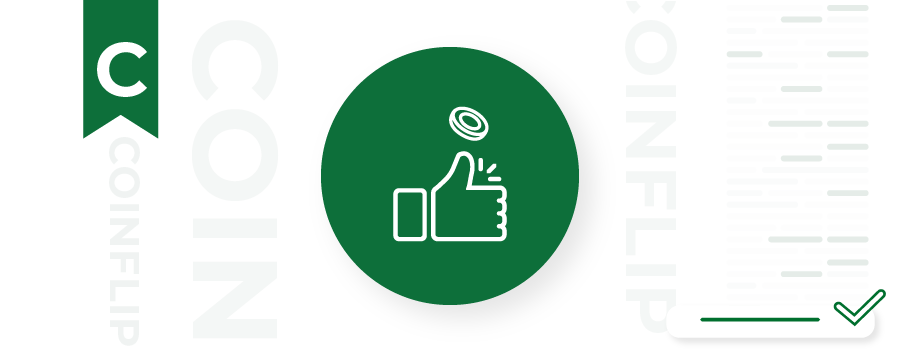
- Cold Deck: 1. A method of cheating where a pre-arranged deck is introduced into a game surreptitiously, with the purpose of dealing one player a very strong but losing hand. 2. A deck of cards that has been particularly bad for a player. Mostly used in blackjack.
- Cold-Call: Making a call when the hand has been bet and raised before the action comes to you.
- Cold: A condition of having bad starting cards for a long time. “I swear; I wasn’t dealt so much as a pair for three hours, I was so cold.”
- Collusion: Coordination of play in a poker game between two or more players, with the intention of cheating other players in the game.

- Color Up: To change from low denomination chips to higher denomination chips.
- Combination: 1. Used as a modifier of “draw”, as in “combination draw”, (combo-draw for short) meaning drawing to two or more possible hands at the same time. Ah Kh with a board of Qh Jh 8s would be a combination draw, as there are nine cards that could make a flush and three additional cards that could make a straight. 2. All of the possible ways two cards may be dealt. AK, 66, 72, etc.
- Combo Draw: A combination draw. See “Combination”
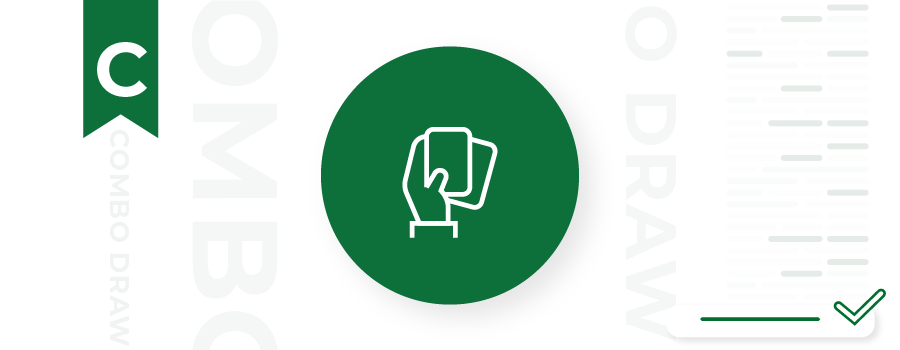
- Community Cards: The board. Those common cards used by all players to make a hand in board games like Hold’em and Omaha.
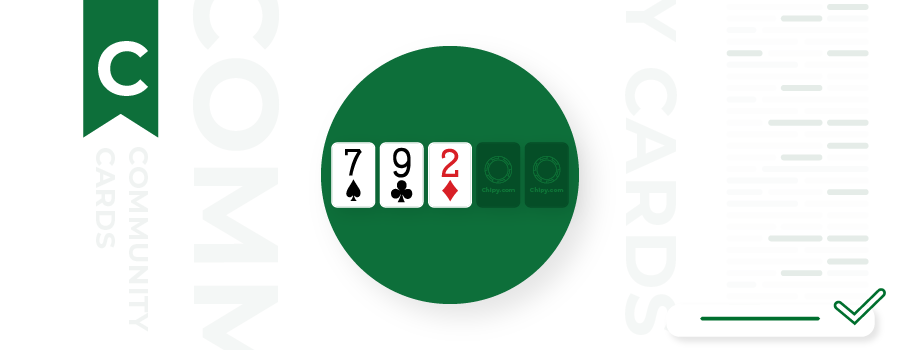
- Complete: To get the card or cards you need to make a strong poker hand. If you are on a flush draw, with four hearts, and a fifth heart hits on turn, you would be said to complete your flush on the turn.
- Comps: Typically, house-funded benefits to players. Rewards for frequent play. Some poker rooms do this by awarding points per hour of play. Others provide free drinks, meals, and rooms. Some provide freeroll tournaments to frequent players. These are all examples of comps.
- Connector: Two sequential cards, such as 8h 7s or Jh Qd.
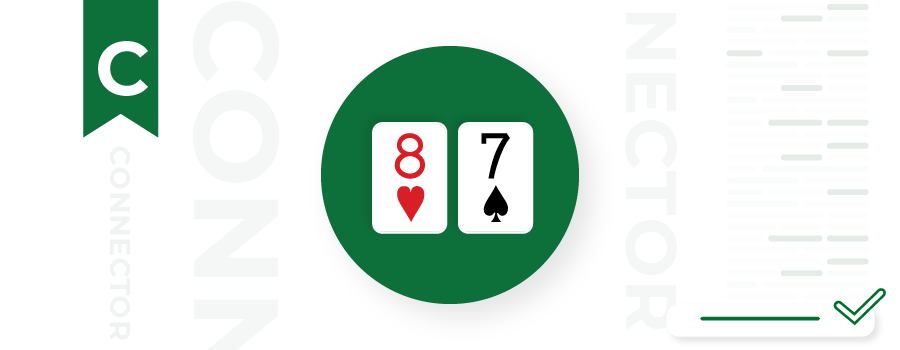
- Continuation Bet: A bet on the flop, after one was the last aggressor pre-flop, even if one has not improved on the flop. Known as a “c-bet” for short.
- Cooler: An unusually strong hand that beats another very strong hand. “Wow. When his Full house ran into her quads, he really got coolered!”
- Coordinated Flop: A flop that has sequencial and/or suited cards in it. JhTs8h would be a coordinated flop.
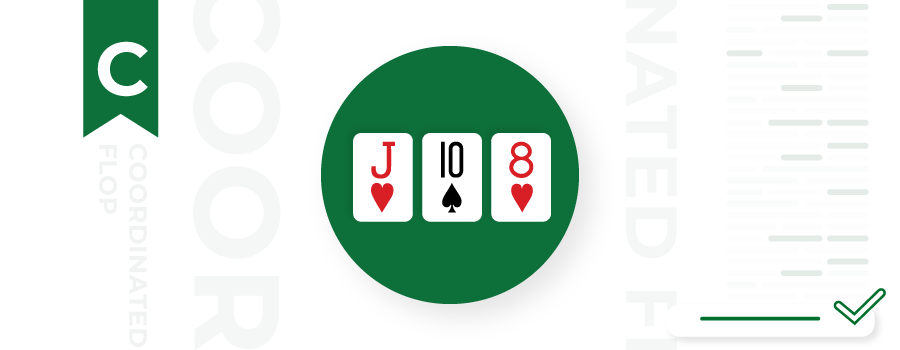
- Counterfeit: A duplicate card that hurts your hand by making another hand have equal or greater value. For example, if you have QT and made a straight on a flop of AKJ, and then a T appears on the turn, giving another player with Q2 a straight as well, you have been counterfeited. This also happens frequently in high-low and low forms of poker.
- Court Cards: Face cards. Paint. Kings, Queens, Jacks.
- Cowboys: A pair of Kings
- Crack: To be beaten, especially to have a pair of Aces beaten. “He was leading the whole way, but got his Aces cracked when his opponent hit runner runner diamonds to make a flush on the river.”
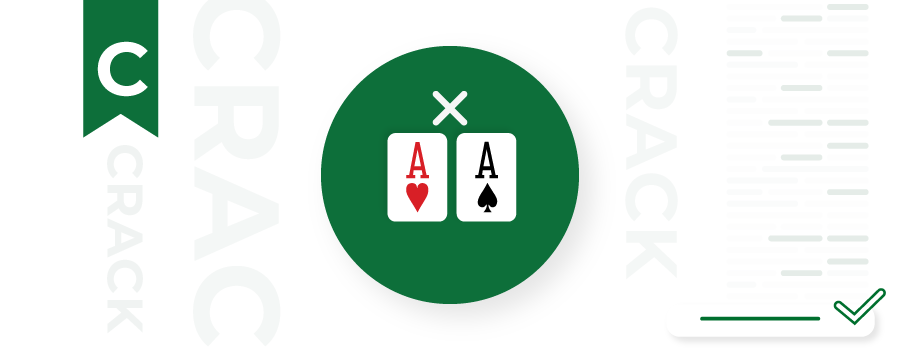
- Crazy Pineapple: A version of the hold’em variant pineapple (see entry), where a player must discard their third hole card after the flop.
- Cripple: To cause someone to lose a hand, especially in a tournament, that reduces a stack practically to nothing. “I called the chip leader’s obvious bluff and crippled him.”
- Crossbook: A last-longer or other wager between two players in a tournament, that gives an opponent some share of their winnings if they do better.
- Crushed: To be hugely dominated. “His Aces had my AK crushed!”
- Crying Call: To call with the expectation of losing (but at least a slim hope of winning), typically made when the pot odds are very large, making a fold unreasonable.
- Cut: 1. Verb: To seek to defeat a cold deck by removing cards from the top of the deck, placing them down, and then placing the remaining part of the deck on top. The act of cutting the cards.
- Cut card: A card used to protect the bottom of the deck from being seen. It is usually a solid color and thicker than a playing card, but the same size.
- Cutoff (CO): The player seated to the immediate right of the button.
D:
- D for Dame: (Instead of Q for Queen) Marking on some decks from some casinos in French speaking countries.
- Daub: A waxy or oily marking, otherwise invisible, used to secretly mark cards for cheaters.
- Dead Man’s Hand: A hand of a pair of Aces and a pair of Eights, named after the hand that Wild Bill Hickock had when he was shot. Sometimes it is also said to include the 9.
- Dead Money: 1. Money in the pot from a player or players who have folded. 2. An amateur or otherwise unskilled poker player, typically in a tournament, with very little or no chance of winning.
- Dead: Not having any draws. I was drawing to a flush, but with all of the folded hearts, I was pretty much dead. 2. A hand that is not valid. “Since you left the table during the deal, your hand is dead.
- Dead Button: A situation that describes when there is no player in the dealer seat for the hand.
- Dead Small Blind: A situation that describes when is no player in the small blind for the hand.
- Deal: 1. Verb: To distribute cards to active poker players in a game. “Stop talking and just deal already!” 2. Noun: Having the responsibility of dealing. “You have the deal. So start dealing!” 3. Noun: To reach an agreement on settling a tournament. “Anyone want to make a deal so we can all go home. I propose an ICM chop.”
- Dealer: 1. The person who deals the hand of poker. 2. The person given the button, who has last action in a house dealt poker game.
- Dealer’s Choice: A variety of poker that allows the designated dealer to choose the variety of poker being dealt (sometimes from an agreed upon list) – typically for at least one round of the game, though in home games, sometimes just for the one hand they are dealing.
- Dealing Seconds: Dealing the second card from the top of a deck. A form of cheating.
- Deck: The cards used to deal a poker hand.
- Declare: To demonstrate one’s intention, especially in a high low game. “On the declare round, you put one, two, or three chips in your hand. One chip means you are declaring low, two chips high, and three chips high and low.” “Verbal declarations are binding.”
- Deep: The size of your stack. “Burnice, do I have you covered? I’ve got about $4,500. How deep are you?”
- Deuce to Seven Lowball: A variety of lowball, with the lowest hand designated as 23457, with straights and flushes counting as high hands, and with the Ace always considered a high card. Compare to California lowball.
- Deuce: The two of any suit.
- Deuces Never Loses: A slang term often said when a pair of twos win a poker hand. Considered humorously trite.
- Dirty Outs: Outs that may also give your opponent a winning hand. Also, “tainted outs”.
- Dirty Stack: A stack of chips that contains one or more chips of a different denomination than all the other chips in the stack.
- Dog: 1. An underdog hand. “I had TT, so against his likely range it was either a small favorite against AK or a big dog against his bigger pair.” 2. A player holding a dog.
- Dominated Hand: A hand that is up against a very big favorite, especially with some shared cards. A9 vs AK, 8h 7h vs Ah 2h, and KQ vs QJ would be examples of dominated hands.
- Donk Bet: 1. Noun: An out of position bet after the flop. 2. Verb: The act of making an out of position bet after the flop.
- Donkey: A bad player. A fish.
- “Don’t Feed the Nit”: Advice on what to do when playing a very tight player who bets.
- “Don’t tap the glass”: An admonition not to do anything to scare the bad players (fish) out of the game.
- Door Card: The first exposed card on third street in stud games.
- Double Belly-buster: A drawing hand with two inside straight draws, either of which will make the hand. For example, holding JT with a board of AK98.
- Down: 1. The condition of being financially behind. 2. A concealed card. “Careful dealer. Make sure you deal that last card down.”
- Down Card: Hole card, especially in stud games; as opposed to upcard.
- Down and Dirty: A somewhat old fashioned phrase that is sometimes uttered, with slight humor, before the last card is dealt in Seven Card Stud.
- Draw: 1. To exchange cards in the card game Five Card Draw. 2. The second betting round of Five Card Draw. 3. The cards drawn in the draw round. 4. Verb: To select a card to assign a seat, or a deal, “Let’s draw for dealer.”.
- Drawing Dead: Drawing to a hand that will lose even if it is made on the draw. Jh 8h with a board of 7h 4h Ks 2s is drawing dead against Ah Kh.
- Drawing Odds: The odds against the filling of a hand. “The drawing odds of a straight draw are roughly 5 to 1 against”.
- Drawing Thin: Drawing to a hand with a very small chance of making it.
- Draw Out: To hit a longshot draw, especially against a hand that was a big favorite to win. To suck out on.
- Drop: 1. A rake, often used to describe the rake that is funding the promotion. “The house takes a $5 rake for itself and then an additional $2 drop that is then returned to the players in the form of the bad beat, high hand, and other promotions.” 2. To fold.
- Drowning on the River: Losing to a player who makes his hand on the river.
- Dry Board: A board that is unlikely to help a drawing hand. As opposed to a wet board.
- Dual Rate: A dealer who also is sometimes a floor person.
- Ducks: Twos.
E:
- Early Position: 1. The first four seats in a full poker game, including the small blind and the big blind. 2. Earlier position. Learn more in my dedicated guide.
- Effective Stack: In a no limit game, the maximum amount that can be wagered with opposing players, considering their stack size and yours. For example, if you have $10,000, but no opponent has more than $1,000, your effective stack is only $1,000.
- Eldest Hand: Player to the left of the dealer. Now commonly call the blind, or if there are two or more blinds, the small blind. (Obsolete)
- Entry Fee: 1. The cost of entering a tournament. 2. The amount the house takes for itself out of the tournament cost.
- Equity Chop: Dividing up the remaining tournament prize pool equally among all remaining players in a poker tournament.
- Equity: The amount you expect to win, on average, in a particular pot.
- Exposed card: A card that is face up.
- EV: Literally “Expected Value”. The amount you expect to make on your bet in the long run. +EV or Positive EV is a bet that has an expectation of making you money in the long run. Similarly -EV or Negative EV is a bet that has a losing expectation in the long run.
- Eye in the Sky: The system of cameras fixed on the casino floor.
F:
- Face Card: A King, Queen, or Jack. Also known as “paint”.
- False Cut: A way of cutting the deck that does not really change the order of the cards, but appears to be a cut. Used by a cheater who wants to preserve a stacked deck.
- False Shuffle: A fake shuffle that attempts to deceive players into thinking a deck has been shuffled.
- Family Pot: A pot when every active player is in, typically noticed pre-flop when everyone calls the big blind.
- Fast: Aggressive play.
- Favorite: 1. The hand more likely to win the pot. 2. The player holding such a hand.
- Fifth Street: 1. The third betting round in 7-card stud, when each active player has five cards. The fourth and final betting round in hold’em and other flop games, when there are five cards on the board. (This is rarely used in hold’em; usually just called “the river”)
- Fill: Make a drawing hand. “Yes I hit another heart and filled my flush on the turn.”
- Final Table: The last table in a multi-table tournament.
- Fish Tank: A game with poor players.
- Fish: A less-experienced, weaker player.
- Five Card Draw: An early variety of poker, with two betting rounds, with players receiving five face down cards, followed by a draw.
- Five Card Stud: An early variety of poker, with four betting rounds, with players receiving one down card followed by four up cards.
- Five of a Kind: Five cards all of the same rank. Only possible with wild cards. The highest possible hand of poker, even better than a straight-flush.
- Fixed Limit: A betting variation that limits what players may bet and raise, typically with two increments, a small bet in the early betting rounds and a big bet in the latter betting rounds.
- Flash: 1. Verb: To expose a card that is not meant to be exposed. 2. Noun: A substance put on a card to make its value apparent to a cheater.
- Flat: To call a bet, as in “flat call”. “He opened on the button and I flatted him with my Kings in the Big Blind.
- Float: To call a bet, typically from later position, with the intention of raising on another street.
- Float Play: A play beginning with a float on one street and then continuing with a bluff on a later street.
- Floor: A public poker room employee who supervises the dealers and helps settle disputes that the dealer does not settle.
- Flop: 1. Noun: The three community cards dealt at the beginning of the second round of betting in hold’em and Omaha. 2. The act of having these cards dealt and used in a player’s hand. “I started with just 6h 4h, but I flopped a straight flush!”
- Flop Game: A poker game involving a flop, like hold’em or Omaha.
- Flush Draw: Having four cards of the same suit and needing one more suited card for a flush.
- Flush: A poker hand of five cards of the same suit.
- Fold Equity: The extra value you get from a bet that forces an opponent to fold. Learn when to fold from my article.
- Force: The player who must post the forced bet on third street, to start the betting in stud games.
- Forced Bet: 1. The required bet, typically twice or three times the ante, in a stud game that starts the betting. 2. The player who must make this bet. Sometimes also “force”.
- Fourth Street: The second betting round, with two exposed cards, in stud.
- Four Flush: A drawing hand consisting of four cards to a flush.
- Four-flusher: A dishonest player, generally meant with a bit of humor.
- Free Card: A card that you get to see without having to call a bet on a prior betting round. “I raised on fourth street in order to have him check to me on fifth street, giving me a free card.”
- Freeroll: 1. A free tournament, with cash prizes, typically provided as a promotion, often to reward frequent play. 2. The situation in a split pot game like Omaha 8 or Stud 8, when you are certain of one half of the pot and are able to compete for the other half. “He had the low with his wheel, and he was freerolling for a flush to win high.”
- Freezeout: A style of MTT that does not consolidate tables, but has each table play down to one winner, with the table winners then assigned to a new table and competing against each other.
- Frequent Player Points: Comps given to poker players in some public poker rooms that reward players for their length of play. These may often be used for food, beverage, and accommodation.
- Full Boat: A full house. Also “boat”
- Full House: A poker hand consisting of trips and a pair.
- Full: 1. Noun: A full-house 2. Adjective: A table without any empty seats.
G:
- Getting Sucked Out On: Losing to a player who makes his hand on the river.
- GG: “Good Game”. The abbreviation of a comment made occasionally in online poker games.
- Give Lessons at the Table: Showing people what they did wrong in the play of a hand – usually with a condescending or dismissive attitude.
- Go Light: To owe money to the pot, as indicated by stacking chips and setting them aside, equal to the amount owed. Typically, not allowed in a public poker room, but practiced in home games that do not have a table stakes rule.
- Good: Having the best of it in a bet. “Yeah, I lost my stack. But I played it right when I got it in good! So I can’t complain. “
- Grind: 1. Verb: To play low and medium stakes poker for a living. Connotes long hours, poor pay, and a lack of glamour. 2. The state of playing in such a way. “He quit his job to play poker, but found it to be no fun, just an awful grind.”
- Grinder: A poker player, especially one who makes his living by playing low or medium stakes. As opposed to “high roller”.
- GTO (Game Theory Optimal): A method of play that seeks to randomize bluffing to insure opponents do not have an advantage.
- Guarantee: The amount that the House is guaranteeing will be paid out in the prize pool.
- Guppy: Another word for a fish.
- Gutshot: An inside straight draw.

H:
- Hand: The cards assembled into a unit with which a player competes against other players.
- Hand History: A description of a particular poker hand.
- Hand-for-hand: In a tournament, before right before the money bubble bursts, dealing all tables one hand at a time, in unison, to insure that there is no incentive for players to play slowly, hoping another table busts a player.
- Heads-up: A pot or game involving only two players.

- Heat: Aggressive action. “Bonnie sure is applying the heat.”
- Heater: A winning streak.
- Hero: A player being described in a hand history. As opposed to villain. “Hero bet $100 and Villain shoved on him.”
- Hero Call: A very difficult call, typically with a weak hand, catching an opponent bluffing. “Wow, he made that hero call with just an Ace high.”
- High Hand Jackpot: A player-funded jackpot that is awarded to the player with the highest hand during a set period of time: as little as 15 minutes or as long as a week.
- High Society: $100 chips.
- High Variance: Big fluctuation in variance. “It was a high variance game, especially when that maniac was in it.”
- High Roller: Someone who plays very big. Usually applied to big players outside of the poker room who also play poker.
- Hijack: 1. The seat two to the left of the button. 2. The player who occupies that seat.
- Hit by the Deck: Getting very good cards, especially when accompanied by a winning streak. “Yeah, Tony left up 14 large. I don’t think it was great play, cause he was just hit by the deck.”
- Hit: To get a hand, typically a made hand. “He hit his flush on the turn.”
- Hit and Run: A very short session, characterized by winning one big pot and leaving.
- HO: A mixed game that alternates between limit hold’em and limit Omaha 8.
- HOE: A mixed game with three different varieties of poker, Limit Hold’em, Omaha 8, and Stud 8 played in rotation, typically for either a set number of hands or a set period of time.
- Hold Me Darlin’: An alternate, and now obsolete, name for hold’em.
- Holdout artist: An expert at holding out cards.
- Holdout device: An apparatus used to stealthily remove cards from play, to be used at a later time to make a winning hand.
- Holdout: A method of cheating, where a card is taken out of the deck to be used at a later time to make a winning hand.
- Hole Cards: Cards dealt face-down to a player.
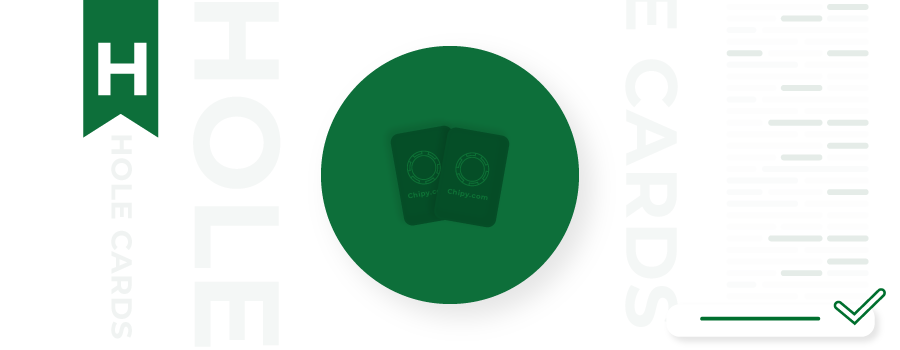
- Hollywooding: Acting in a poker game, typically meant to seduce an opponent into calling a large bet. Hollywooding is largely derided by serious players, though many engage in it because it often works in inducing a call.
- Home Game: A poker game played out of someone’s home, typically without a financial interest in profiting from the game. As opposed to “house game”.
- HORSE: A popular mixed game consisting of limit hold’em, Omaha 8, Razz, Seven Card Stud, and Stud 8 played in rotation.
- Horse: A tournament participant who is backed by an investor. The investor typically buys a percentage of the horse’s action, paying a premium based on the horse’s prior success.
- HOSE: A popular variation of HORSE, played without the round of Razz.
- HOSER: A variation of HORSE, where Razz is played after Seven Card Stud and Stud 8 in the rotation.
- Hot: To be on a winning streak. “Jesu got hot and doubled up.”
- House: The operator of a poker game.
- House Game: A game run out of a home , motel room,or other private space, and typically with the house deriving a profit from the game like a casino or poker room.
- HUD: Acronym for “Heads Up Display”, an online poker device for displaying information about opponents during a poker game.
I:
- ICM Chop: Formally, “Independent Chip Model” Chop. A division of the prize pool according to an established formula based on the tournament chips of the remaining players. Considered by many to be more fair than an “equity chip” that would just divide up the money equally among all remaining players.
- Ignorant End: The lower end of a straight.
- Implied Odds: The inferred pot odds when considering the money you think you are likely to win on future betting rounds in the hand.
- In: 1. An active player in the game. 2. An active player in a hand.
- In-the-black: Financially ahead. “He finished the session $1,100 in-the-black, so he was smiling.”
- In-the-dark: Without looking at the hole cards or before a round of exposed cards is dealt. Players will sometimes “Check in the dark”, meaning they check in anticipation of cards that are dealt to begin a betting round.
- In-the-red: Behind. “In spite of his lucky draws, he was still $540 in the red for the day.”
- In the money: Make the prize pool in a tournament.
- Inside Straight: A drawing hand that can become a straight only with one rank (as opposed to an open-ended straight that can be filled with either of two ranks. T976 is an inside straight, as it can only be filled with an Eight. T987 is an open-ended straight, as it can be filled with either a Jack or a 6.
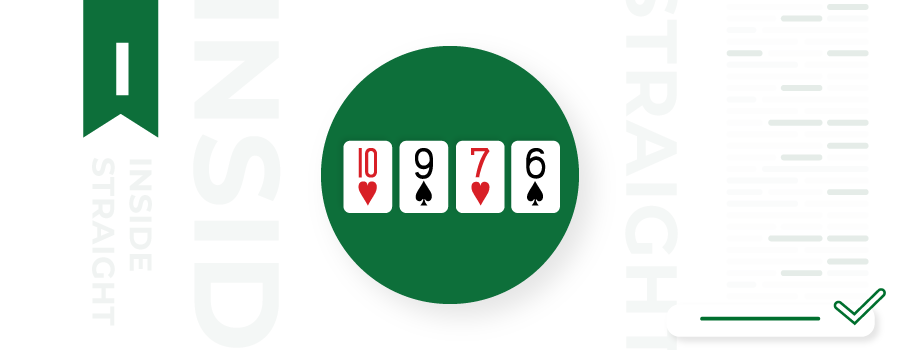
- Insta-call: To call immediately after a bet is made.
- Isolate: Getting heads up against a player, typically with a raise.
J:
- Jacks Back: A variety of Five Card Draw jacks-or-Better, where openers escalate, if the hand is not opened, from Jacks to Queens to Kings, etc., until they reach Aces; and then they descend in reverse order.
- Jackdaw: A poker home game variation of stud, where players bid for up cards.
- Jacked Up: 1. Raised. “That wild man kept jacking up the pot, making it nearly impossible to play against him.” 2. Robbed. “Louie had his game jacked up by guys dressed as cops.
- Jackpot: A pool of money that is awarded to a player, and often grows for as long as it is not hit. These are typically player-funded, with a drop taken from the pot. But sometimes they are house-funded. See “Bad Beat Jackpot”.
- Jackpots: A variety of Five Card Draw, where players continue to ante, and leave their antes in the pot, until a player with a qualifier opens.
- Jam: Verb: To shove. To go all in. “He called the turn and jammed the river.” 2. An all-in bet. “He took down the pot with his jam on the river.”
- Joker: A 53rd card added to the game as a limited wild card, known as a “bug”, in some variations of Five Card Draw and Lowball. Was especially popular in California, when draw and lowball were regularly spread, before the laws were changed to allow stud and hold’em.
- Juice: The amount the house charges players to play, either with a rake, a drop, time, or some other manner of collecting money. Also known as the vig or vigorish.
K:
- Kansas City Lowball: A form of lowball, where the best low is the 75432, with flushes and straights hurting a low, and with Aces always considered high cards. Also known as “deuce to seven lowball”. Often played with three draws, and known as Triple Draw Lowball or just “Triple Draw”.
- Kibbitzing: The conversation of poker game observers.
- Kicker: 1. The highest unpaired card that is used to break a tie between two equal paired or two paired hands. 2. In draw it is the third card, typically an Ace, kept on a two-card draw to a pair. I
- Kill: A betting modification that typically doubles the bets after a player wins two hands in a row or wins a pot of a certain relatively high amount. “We’re playing $6/$12 Omaha 8 with a kill. The kill is on when a player wins both halves of the pot, and the pot is at least $100.”
- Kitty: In home games, a pool of money created by taking a small rake from the pot. Often used to buy refreshments or cards for the game.
L:
- Ladies: A pair of Queens
- LAG: A loose and aggressive player.
- Late Position: The last few players to act in a poker game. In a ten-person game it would be the button, the cutoff, and the hijack.
- Laydown: 1. Noun: A difficult fold, especially with a good hand. “I saved my tournament life by making a colossal laydown against his monster.” 2. Verb: The act of making such a fold. “I may have laid down a winner, but I couldn’t take the risk of getting knocked out.”
- Lead: 1. Noun: The stronger or strongest hand as the hand is progressing. “He had the lead on the flop, but I had outs.” 2. Noun: The last aggressor of a betting round. “I three-bet pre-flop because I wanted to grab the lead, going into the flop. 3. Verb: Making the initiating bet on a betting round. “I led the betting on the turn because I sensed by opponents were all weak.”
- Leave money on the table: Failing to win as much money as possible by missing an opportunity to bet. "He was afraid, so he didn't bet the river, leaving money on the table."
- Leak: A weakness, especially that causes someone to lose money. “He was a winning poker player, but he played craps, a major leak that kept him broke all the time.”
- Light: A hand that is weaker than typical for the bet that is being made. “They thought I was really tight; so I frequently stole the pot with a light 3-bet.”
- Limit: 1. The stakes for which poker game participants are playing. 2. A form of poker with fixed limits. As opposed to pot limit or no limit.
- Limping: Calling, rather than raising a bet, especially pre-flop.
- Live blind: A blind bet that retains the ability to raise if no raises are made.
- Live: In stud, cards that may are still left unseen. “I called his bet with my flush draw because my hearts were still live.”
- Live One: A loose player, typically with deep pockets. “Barry, you’ve got to get a seat in this game. There are two live ones. It’s like printing money.”
- Live Poker: A retronym meaning a traditional poker game, not played on line, and not a tournament.
- Lock: A guaranteed winner, especially of one half of a split pot game. “I was freerolling with the lock low.”
- Lojack: 1. The third seat to the right of the dealer. 2. The player in that seat.
- Look You Up: To call someone thought to be bluffing. “Well, mister, I’m going to pay that $185 just to look you up!”
- Loose: A style of play that is characterized by a tendency to play rather than fold. The opposite of tight.
- Low: The low half of a pot in a high low game. “I won the high, he won low.”
- Lowball: A form of poker that ranks hands opposite that of a conventional poker game. In some forms of the game A2345, known as the wheel, is the best hand (as the straight is not counted against it). In another form of the game, 2-3-4-5-7 is the best hand, since straights are considered high hands and Aces are considered high cards.
- Low Roller: A low stakes player.
M:
- Made Hand: A hand which cannot be improved or does not need to improve to win. The hand to which you are drawing, that you make.
- Main Pot: The pot that is created from players before anyone is all-in and unable to call additional amounts. Contrast with a side-pot (see definition below).
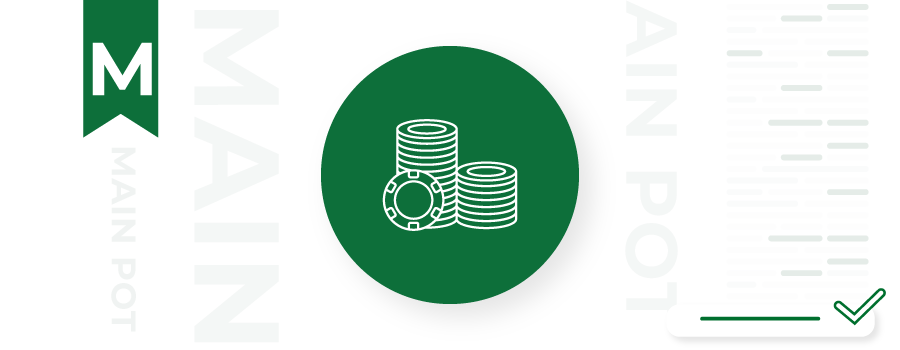
- Maniac: An extremely, almost insanely loose and aggressive player.
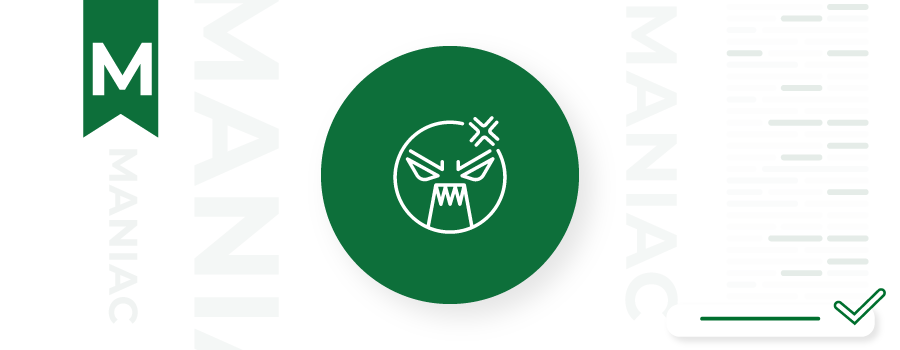
- Mark: The inexperienced or otherwise inept target of a skilled or dishonest player.
- Marked Cards: Cards that have been marked by a cheater or an accomplice, so the cheater can identify the value of a card from their backs.
- Match the Stack: A modification of the buy-in cap, that allows players to buy in for as much as the largest stack at the table.
- Maximum rake: The most money that may be taken from any one pot by the house. Typically rakes are defined by the percentage and the maximum that is taken. For example, a rake would be said to be 10% with a $6 maximum.
- Mechanic: A slang term for a cheating player who can experty and crookedly arrange and deal cards in order to cheat opponents.
- Micro-limits: The very small limits only found on line, such as $.01/.02, .02/.05, and .05/.10. See Micro-stakes.
- Micro-stakes: The very small stakes only found on line, such as $.01/.02, .02/.05, and .05/.10. See Micro-limits.
- Middle Position: The middle players in a typical ring game, specifically the five, six, and seven seat.
- Min-raise: 1. The minimum allowable raise, typically twice the prior bet or raise. In a $2/5 game, raising to $10 would be considered a min-raise. 2. The act of making a min-raise. “I wanted to keep other players in, so I just min-raised him.”
- Misdeal: A mistaken deal requiring that the cards be gathered up, reshuffled, and redealt. Not all dealer errors result in a misdeal.
- Mixed Game: A poker game that has a rotation of different games. HORSE and OE are examples of mixed games.
- Monster: A very strong hand. “The only way he could have been ahead was if he was dealt a monster.”
- MTT (Multi-table Tournament): A tournament designed to have more than one table; as compared to a Sit & Go, which is generally only played on one table.
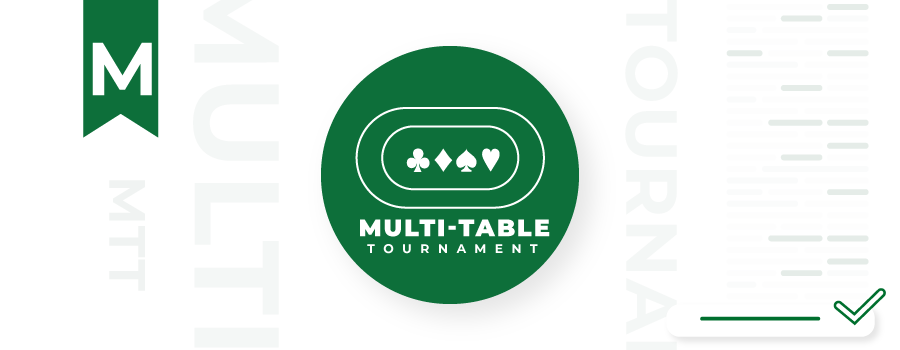
- Muck: 1. Verb: To fold 2. Noun: The folded cards.
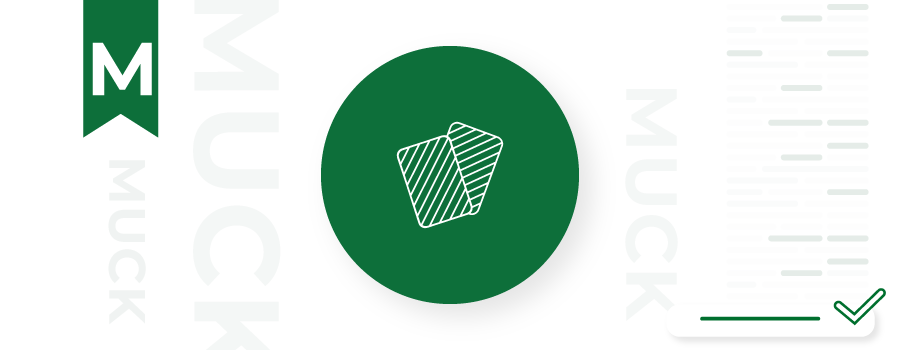
- Must Move Game: A game in a poker room where players are regularly moved involuntarily into a main game of the same stake.
N:
- Narrow Range: A range of hands consisting of few hands. As opposed to a broad range.
- “Nice Catch”: An expression, usually said sarcastically, implying that an opponent played badly and only won because they got lucky and caught a perfect card.
- Nit: An extremely tight player. A rock.
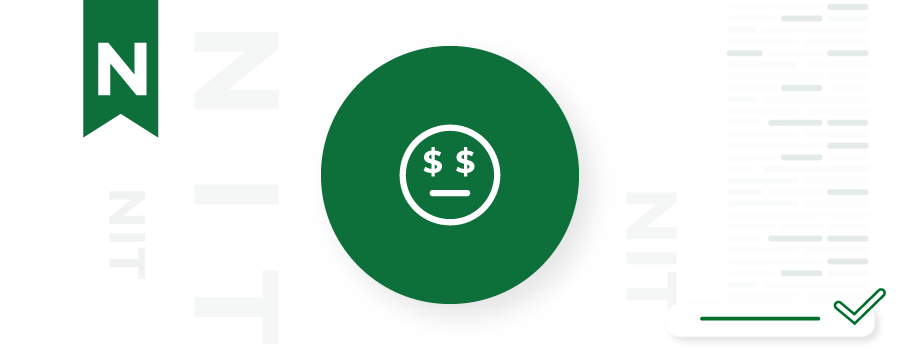
- NLHE: Abbreviation for No Limit Hold’em.
- No-limit: A type of game, especially hold’em, that allows players to bet as much as they like, up to the size of the stack they started with at the beginning of the hand.
- Nosebleed Stakes: The very highest high stakes poker.
- Nut high: The best possible high hand that can be made with the board, especially in a split-pot high low game.
- Nut low: The best possible low hand that can be made with the board, especially in a split-pot high low game.
- Nuts: The best possible holding, considering the board, in any particular hand.
O:
- Odd Chip: When a pot is divided, a chip that cannot be divided that is left over.
- OE: A mixed game that alternates between Omaha 8 and Stud 8.
- Off: Offsuit.
- Offsuit: Cards, especially starting hole cards, of different suits. For example, Ah 2s may also be referred to as Ace Deuce off-suit.
- Omaha 8 (a.k.a Hi Lo): A split pot variety of Omaha that is played with the high and a qualifying low hand dividing the pot.
- Omaha: A card game similar to hold’em, in that the flop, turn, and river are dealt in the same way. In Omaha, each player receives four cards, all dealt face down. Players use exactly two of those cards combined with three community cards to make a five-card poker hand.
- On the Button: In the position of the dealer, with last action.
- On the rail: Observing a poker game (especially when a player has busted out.
- One-gapper: Cards, typically hole cards in hold’em, that are separated by one card in rank. 8h 6s would be a one-gapper.
- Open: 1. Verb: To begin the betting by raising the big blind pre-flop. 2. Noun: An unoccupied seat at a poker table. 3. Adjective: A general form of poker with exposed cards, like 7-card stud.
- Openers: A required minimum hand for opening, especially in Five Card Draw Jacks or Better.
- Orient Rs: Three Kings (from “We Three Kings of Orient Are)
- Orbit: A round of poker, with every player having a turn to be the dealer.
- Out: 1. Not playing. “No, Joey’s at the cage. He’s out.” 2. Not being dealt to because you’re leaving the game. “Deal me out. I’ve had enough!” 3. Not in a hand, having folded. “Nah, I’m not calling. I’m out!”
- Outrun: To draw better than an opponent. “Your top two on the flop is pretty, but he might outrun you by catching a flush.”
- Outs: The number of cards that will make a drawing hand. If you’re on a flush draw, with nine unseen cards of your suit, you’re said to have nine outs.
- Over-the-top: Raise or re-raise. “I bet, but then he came over-the-top, so I folded.”
- Overbet: A bet that is larger than typical for the situation, especially one that is more than the size of the pot.
- Overcall: To call a bet that has already been called.
- Overcard: A card of a higher rank than another card, typically any card on the board. If you have Ah 6h with a flop of Kh 7h 7s, you might say that you have “A flush draw with an overcard to the board that could give you top two.”
- Overhand Shuffle: A method of shuffling, not as efficient or thorough as a riffle shuffle, that moves cards in small packets or “clumps”, from the top of the deck to the bottom of the deck, mixing the cards in the process.
- Overlay: A prize pool that is guaranteed to be larger than is collected from entries.
- Overpair: 1. A pair that is higher than both of an opponent’s hole cards. 2. A pair that is higher than the board, “overpair to the board”.
- Overs: Higher stakes than the regular stakes of a game. See “playing the overs”.
P:
- Paint: A face card.
- Pair: 1. Noun: Two cards of the same rank. 2. Verb: To receive and make a pair. “You’ve got to be careful in stud when an opponent pairs his door card.”
- Par: The average chip stack in a tournament.
- Pass*: 1. To check, letting the option of initiating the betting go to the next player. 2. To fold if there is action in front of you. * (It should be noted that there is disagreement about whether saying “pass” when there is no action, means that you fold.)
- Passive: A playing style characterized by a general passivity in betting. A player who rarely raises or initiates the betting is said to be passive.
- Pat hand: In draw, a hand that does not need to draw. A made hand before the draw.
- Pay You Off: An expression made when calling, meaning there is an expectation of losing and “paying off” the likely winner. Typically, a player faces a bet, and utters this expression when he makes a crying call, perhaps thinking he is getting sympathy or saving face as he loses a hand.
- Peaking: The practice of looking at another player’s down cards. It is considered either cheating or angle-shooting depending on how much effort the peaking player puts in to catching a peak.
- Penny ante: A very low stakes game, typically just played for fun. “I started playing poker when my grandparents let me sit in their penny ante game.”
- Perfect: The best possible low hand headed by cards already named. Also called “smooth”. A 76 perfect would be 7632A.
- Pick off: To call someone who is bluffing, and win.
- Pineapple: A variety of hold’em, with players receiving three cards instead of two, and then discarding one before the flop.
- Play the Board: The situation in hold’em when the best hand you can make are the five cards on the board, without using any of your hole cards.
- Player’s Card: The casino-issued, credit-card sized plastic card that is used by the casino to both track your play and reward you for your play.
- Playing Over: Playing at the seat of an absent player, typically with a cover over their chip stack.
- Playing the Overs: Playing at a higher stake, though at the same table with players playing the regular stakes.
- PLO: Pot Limit Omaha. Omaha played high only (not Omaha 8) with pot limit stakes.
- Pocket Pair: A paired hole cards.
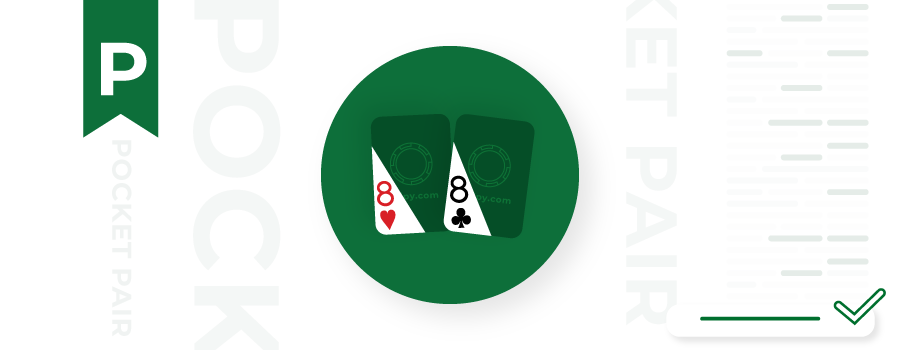
- Pocket: The two hole cards.
- Pocket Rockets: A pair of Aces in the hole.
- Poker Face: An impassive expression meant to reveal nothing about your hand. This is one of the common ways to dodge poker tells.
- Position: Where you’re sitting relative to the dealer. Where you’re sitting relative to the remaining player or players in a hand. “I didn’t have great cards, but I had position on him, and I knew how he played.”
- Post: To make a bet, especially when putting up the blind bet. “He’s been distracted with that book and keeps forgetting to post his blind.”
- Pot: 1. The sum of money or equivalent, formed from money from players in the form of antes, blinds, bets, and raises, over which players compete, and awarded to the winner of a hand. 2. An expression meaning, “I bet an amount equivalent to the size of the pot” in a pot limit game.
- Pot Committed: A situation when a player feels compelled, correctly or incorrectly, to call a bet because of the pot odds they are getting on their call.
- Pot Control: A strategy of play meant to limit the size of the pot.
- Pot Odds: The ratio of the pot to the bet or raise you must call to stay in the hand.
- Pot-Limit: A betting structure that allows a player to bet or raise any amount between a set minimum bet and the current pot size.
- Pot: 1. Noun: The money that has been bet in a hand of poker. 2. Verb: An expression meaning “I bet the size of the pot.” typically uttered in PLO or other pot-limit games.
- Pre-flop: The betting round before there is a flop.
- Premium pair: AA, KK, QQ, JJ, or TT.
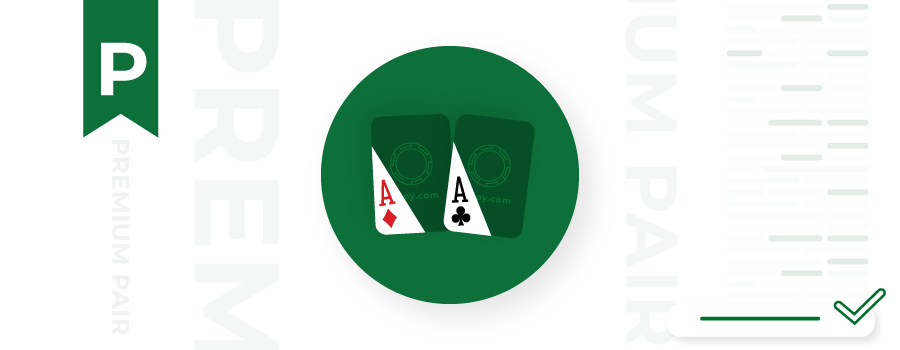
- Price: The cost of a bet, usually in the context of comparing pot odds to drawing odds. “The chance of me making my flush were just about 4 to 1. But, even though his bet of $500 would bust me if I lost, since I was getting such a good price, with a pot of $1,500, I had to make the call.”
- Promotion: A special jackpot, bonus, freeroll, or other gimmick, designed to bring players to the room. Often funded by players, with money, in addition to the rake, taken out of the pot by the house.
- Prop: More formally “Proposition Player”. A poker room employee, generally paid a minimal wage, who sits in games, as assigned by the House, to start games and to keep games going. Props play with their own bankroll, keep their winnings, and suffer their own losses. Compare to shills, who play with House money.
- Protect: Betting large enough to get drawing hands to fold. “I prefer no limit to limit, because in limit you can’t bet big enough to protect your hand!”
- Push/Fold Chart: Charts that show players when to shove and when to fold based on their hand and the size of the pot.
- Put On a Hand: The process of estimating an opponent’s hand.
Q:
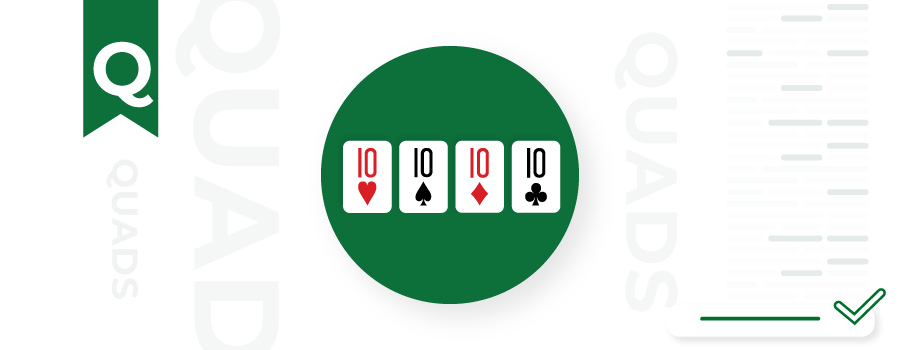
- Qualifier: A minimum hand required to win a pot. Especially used in high-low games to refer to low. “That Omaha 8 game is played with an 8 qualifier for low.”
- Quartered: Getting only one quarter of a pot, typically in a split pot game, by losing one half and tying for the other half. “He thought he had a sure thing with his A2, but he ended up getting quartered and losing money.”
R:
- Rabbit Hunt: To look through the deck, after the end the play of the hand, looking for cards that might have been played had the game continued. Generally disallowed by the House.
- Rack: 1. The hard plastic container used to transport and hold poker chips. 2. The chips it takes to fill a rack. “It takes two racks of blacks to enter that game.”
- Ragged: Uncoordinated cards, as in “ragged board” or “ragged flop”.
- Rags: Bad cards.
- Railbird: An observing poker player, used derogatorily, implying a player who busted out and may be looking for a handout.
- Rainbow: A flop of three different suits.
- Raise Blind: To raise without looking at one’s cards.
- Raise: 1. Verb: To increase the bet, after someone has bet. 2. Noun: The bet someone makes when they raise. “Stella bet $20 but Russell raised her to $100 - and $80 raise.”
- Rake: 1. Noun: The amount the house takes out of a pot or a tournament entry fee. 2. Verb: To take money out of the pot, as a charge to the player who wins the pot.
- Rakeback: Money returned to the player by the poker room, from the rake the player paid, especially when playing in an online poker room.
- Ram and jam: Bet and raise aggressively.
- Range: A player’s estimate of the possible hands an opponent is likely to be playing.
- Rank: The value of the card, from 2 to K.
- Rapping Pat: Also Standing Pat: In draw or lowball, not taking any cards in a draw round.
- Rathole: To take chips out of the game and put them in your pocket. Usually against the rules in a table stakes game.
- Razz: Seven Card Stud played with the low hand winning. Best possible hand is A2345.
- Re-draw: To make a hand and have a draw for an even stronger hand.
- Re-raise: 1. Verb: To raise a raiser. 2. Noun: A raise that raises a re-raiser.
- Read: An understanding of an opponent’s likely range. “He shows no tells. I can’t get any read on him”
- Rebuy: In a tournament, an additional stack of chips that can be purchased for an amount typically less than the initial buy-in, during the early stages of the event, and equal to some fractional portion of the starting stack of chips.
- Represent: Betting, typically as a bluff, to make a weaker hand look like a stronger hand. “I only had K2 but I bet to represent a pair of Kings.”
- Reveal: A home poker game where players are dealt five cards, that they arrange in order of how they will be revealed, one at a time. Four community cards are also revealed at the same time.
- Rey: In some poker rooms in French-speaking countries, the King, represented by an R instead of a K.
- Riffle Shuffle: The common method of shuffling, employed by professional dealers, that first divides the pack into two equal portions and then integrates the deck by having cards from the left and right halves alternately mix together, one card on top of the other, in a quick motion controlled chiefly by the thumbs.
- Ring Game: A retronym used to describe a non-tournament poker game. Before there were poker tournaments, a ring game was just called a poker game.
- River: 1. The fifth and final community card. 2. The final betting round.
- Rock: 1. Noun: An extremely tight player. 2. Verb: To play extremely tightly, as in “to rock around”. 3. Noun: A device used to stimulate action, that is awarded to a player winning the pot, requiring them to post a third blind. Big O is sometimes played with a rock.
- Rockaramma: A game of poker with a lot of rocks and with everyone playing very conservatively. A term of at least mild derision. “I sat down, and it was like rockaramma. I don’t think one hand was shown down in the entire hour I was there. Tight bastards!” Also rockfest and rock garden.
- Rockets: Aces
- Roll Your Own: A home game variation where players turn up one or more of their down cards.
- Rough: A hand in a lowball game that has relatively high cards to go with the lowest card in the hand. 8762A would be an example of a “rough 8”. 6543A would be a “rough 6”. As opposed to “smooth”.
- Round: 1. The stage of betting in a poker hand. Pre-flop would be the first betting round in hold’em and Omaha. 2. An orbit of a mixed game, where each player gets a chance to deal a game, before the game changes. “It was HOSER, so we played a round of Stud 8, followed by a round of Razz before we started with Hold’em again.”
- Royal Flush: A royal. The highest straight flush. As Ks Qs Js Ts.
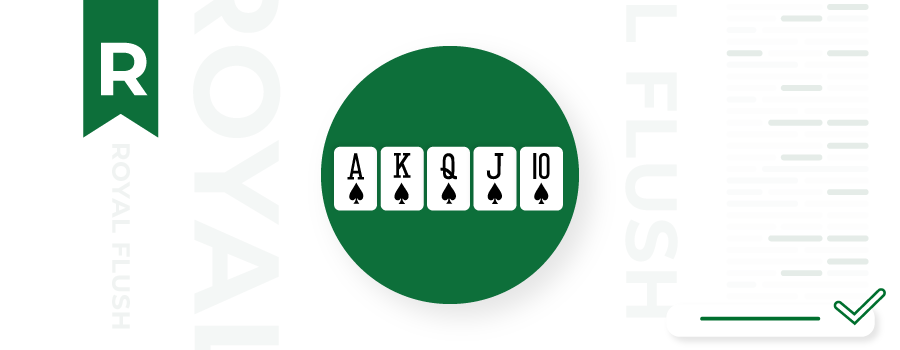
- Royal Straight Flush: A royal flush. Ad Kd Qd Jd Td.
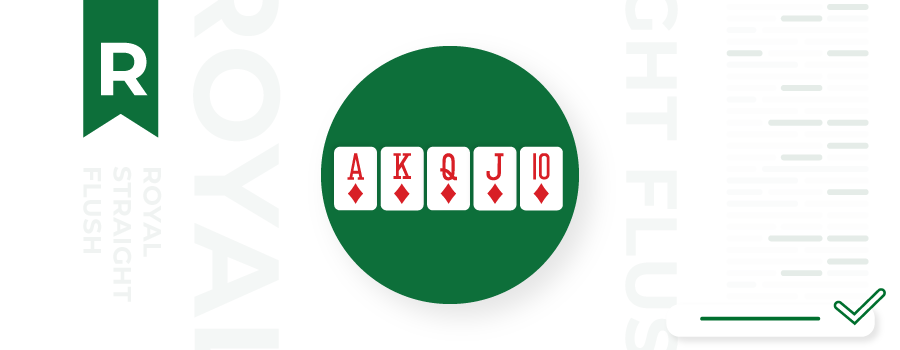
- Royal: A royal flush. Ah Kh Qh Jh Th.
- Run: Have. “We run a mixed game tournament on Tuesdays.” “Hi, poker room manager? What games are you running right now?
- Run bad: To have a losing streak, especially a long losing streak. “I swear, I have been running bad all year.”
- Run good: To have a winning streak. “Jerry is a great player when he is running good.”
- Run it twice: When there is an all in player, and when the parties agree, to deal two different boards or parts of the board, using them to make different hands; and agreeing to divide up the results of the different hands. It is used to reduce variance. Also done three or more times. “Before we deal the turn, how many times would you like to run it?”
- Runner-Runner: The two cards necessary to make a back-door draw. “He went runner, runner – getting two clubs, and made his backdoor flush. Unbelievable!”
- Rush: A winning streak. “I just keep raising pre-flop when I’m on a rush.”
S:
- Sandbag: To slow play, especially by check-raising. Sometimes considered “sharp” play by old fashioned poker players who don’t really understand the essence of the game.
- Satellite: Preliminary tournaments that award an entry or the cash to purchase an entry into a larger tournament.
- Scare Card: A card that looks like it gives an opponent a great hand.
- Scary Board: A board that looks like it gives an opponent a great hand.
- Scoop: To win both sides of a split pot game.
- Semi-bluff: A bet that can win as a bluff and, if it doesn’t work as a bluf, can win by improving on the next card.
- Semi-demi-bluff: A semi-bluff that also may be the strongest hand.
- Set: Three of a Kind made with two hole cards.
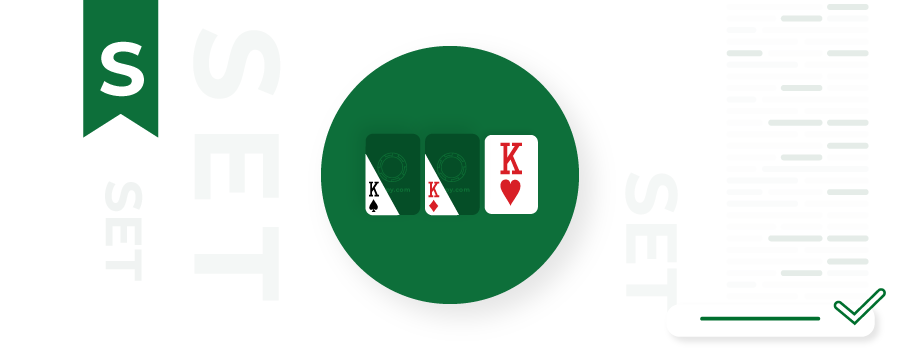
- Seven Card Stud: A variety of poker with each player making their best five card poker hand from seven individual cards, three dealt face down and four dealt face up. It was the most popular form of poker before hold’em.
- Seven Stud Double Qualifier: A split pot poker game, with one half awarded to the highest hand if it is at least two pair, and the other half awarded to the lowest hand if it is an 8 low or better. (If neither half qualifies then the pot is split among all remaining players)
- Seven Toed Pete: An alternate, and now obsolete, name for Seven Card Stud.
- Sevens Rule: A rule requiring a player bet a seven-low or better hand in a lowball game. Now largely obsolete.
- Seventh Street: The final round of betting in Seven Card Stud. Also known as the river.
- Shark: A highly skilled poker player. Sometimes considered derogatory. “Sure we need another player Thursday night. But don’t invite Jesse. He’s a shark.” Also “card sharp”. Difference in meaning between the two expressions is inconsistent.
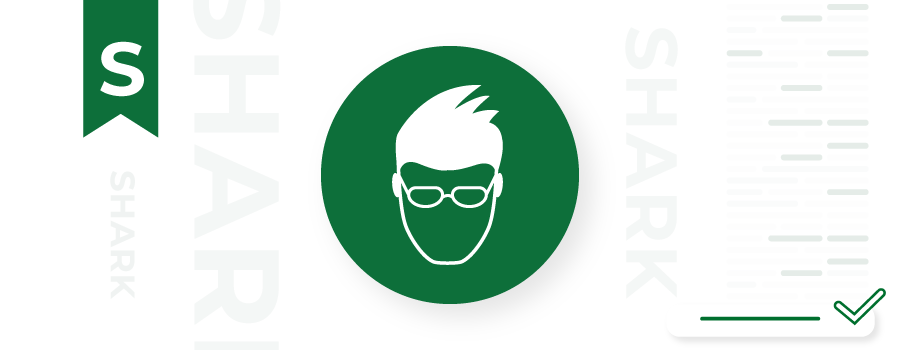
- Sharp: See “Shark”.
- Shill: A poker room employee who sits in games and plays with house money, in the interest of the house and himself.
- Shiner: A reflecting device, positioned so the image of cards dealt over them is reflected back to a cheating dealer.
- SHOE: A mixed poker game, starting with Seven Card Stud, followed by hold’em, Omaha 8, and finally Stud 8.
- Shootout: A form of poker tournament that has each table play down to a single winner, and then has the winners compete against each other.
- Short Buy-in: To buy in for the minimum or for much less than the maximum.
- Short deck: Also known as “stripped deck”. A form of poker with all of the 2s, 3s, 4s, and 5s taken out of the standard 52-card pack.
- Short decked hold’em: A variety of hold’em played with a short deck. The standard ranking of the hands is slightly different, with a flush beating a full-house.
- Short handed: A game of poker played with significantly fewer players than normal, typically 6 or fewer players.
- Short-stack: 1. A small stack of chips, especially when there are larger stacks of chips. 2. A player with a short stack of chips. 3. A strategy of playing no limit or pot limit that has a player buy in to the game deliberately with a short stack of chips.
- Shove: To go all in. “He called the turn and shoved the river.”
- Showdown: The final comparison of hands if there is a called hand on the river.
- Shrewsbury Stud: A home game variation of Stud 8 with four community cards.
- Shuffle: Verb: To mix the cards, typically done by the dealer or a machine embedded in the table. Noun: The mixing of the cards.
- Shuffle Machine: The machine, typically embedded in a poker table, that shuffles cards.
- Shuffle Master: The company that typically leases shuffle machines to poker rooms.
- Side Pot: A pot that is made from bets from players with more money to wager after a player is all-in. “The total amount bet is $80. Joe’s all in with just $40. “We have $120 in the main pot, and then $40 each from the two of you in a side pot.”
- Sit and Go: A one-table tournament, usually with 8, 9 , or 10 players, with a very fast structure, and that typically rewards 1st, 2nd, and 3rd place.
- Six-max: A poker game structured with only six players.
- Sixth Street: The penultimate betting round in Seven Card Stud.
- Skeet-flush: A skeet that is also a flush. It ranks below a straight-flush but better than quads.
- Skeet: A freak hand in poker, also known as a pelter, allowed in some private games, that ranks above trips and below a straight. It is a hand with a 2, 5, and 9 and two other cards, unpaired, between 2 and 9. 9 8 5 3 2 is a skeet.
- Slow Play: To attempt to deceive opponents into thinking your very strong hand is weak by not betting or raising as you would a strong hand.
- Slow Roll: To show your winning hand very slowly, or with unusual delay. Considered very bad form.
- Small Ball: A style of poker that attempts to win many pots, especially small pots, with aggression and small bets.
- Smooth: A very small variety of a low hand in a low version of poker. In razz or lowball, a 8432A would be a smooth 8. As opposed to a rough 8.
- Snap Call: To call immediately. An insta-call.
- Snow: To bluff, especially in lowball.
- Soft Play: To help another player at the table by playing un-aggressively against them, especially when colluding with them. Normally considered to be cheating.
- Speeding: Playing too aggressively (especially when being caught bluffing). “Well, I guess I’ve been speeding. So it’s no wonder you finally caught me!”
- Spike: To be dealt, especially a single good card. “He was behind, with just a pair of Aces against her two pair, but he spiked an Ace on the river and won the hand.”
- Spit in the Ocean: A variation of Five Card Draw, with a common card. May have been a forerunner to hold’em.
- Splashing the Pot: Putting chips into the middle of the table, especially when it makes it hard to determine whose chips they are. Typically against the rules.
- Split Pair: A pair made between a hole card and an up card in a stud game.
- Split Pot Game: A game with a split pot such as Omaha 8 or Stud 8.
- Split Pot: 1. Noun: A pot that is divided.
- Splitting Openers: In Five Card Draw, breaking up the pair required as an opener to draw to another hand.
- Spread Limit: A poker game structure that allows bets within a range. $2-10 Stud 8 is an example of a spread limit game.
- Squeeze Play: A play that seeks to win the pot by raising after someone limps into the pot.
- Stack: 1. Noun: The chips someone has in front of them. “Wow, look at the huge stack he has. He must have won a couple of big hands.” 2. Verb: To win someone’s entire stack of chips. “Wow, look at the huge stack. He must have stacked someone.”
- Stacked Deck: A deck that has been deliberately and surreptitiously arranged, so when it is dealt it will benefit a player. This is a blatant form of cheating.
- Standing Pat: Also Rapping Pat. In draw or lowball, not taking any cards in a draw round.
- Steam: To go on tilt.
- Stop and Go: A play that has the player calling, rather than raising on one round; and then betting or raising on the subsequent round.
- Straddle: A voluntary third blind, typically from under-the-gun or the button, that is usually double the big blind.
- Straight: A hand consisting of five consecutive and unsuited cards. Better than trips but not as good as a flush.
- Street: A round of betting.
- String Along: To limp. To call.
- String Bet: A bet or raise made in more than one motion that is not announced in advance. The classic example is saying “I call” and moving chips into the pot. And then saying, “And I raise” and then moving additional chips into the pot. This is against the rules in every public poker room.
- String Raise: A string bet.
- Stripped Deck: A short deck, with the 2s, 3s, 4s, and 5s removed.
- Stud 8: A split pot poker game, with one half awarded to the highest hand and the other half awarded to the lowest hand if it is an 8 low or better. If there is no qualifying low, the high hand wins the entire pot.
- Stud: 1. A version of poker consisting of down cards and upcards. 2. Seven Card Stud.
- Suit: One of four categories of cards in poker: clubs, diamonds, hearts, or spades.
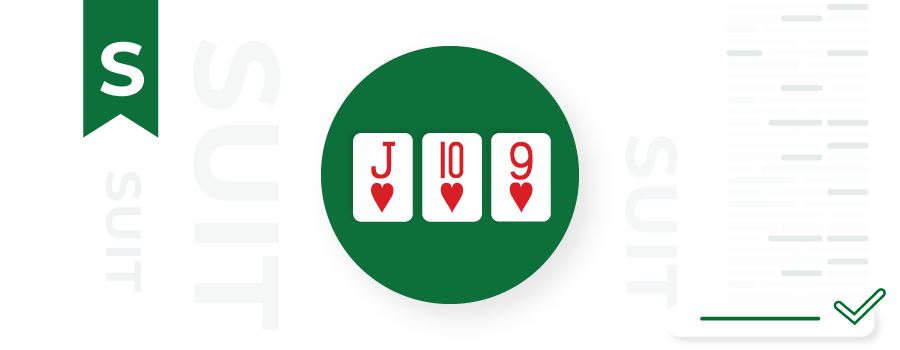
- Suited Connectors: Two cards, especially hole cards, that are consecutive and suited. Jh Th would be suited connectors.

- Suited: Cards that share a suit.
- Sweating: Sitting behind and watching someone play poker.
T:
- Table Captain: A player who has taken control of the game (or is fighting with the dealer to do so), directing the action, and generally in charge of the game.
- Table Stakes: A rule in poker that you may not use any money not in your stack at the start of the hand. It also allows players to call a bet for their stack, even if the bet is for more than they have in front of them.
- Table: To turn over your cards at the show down.
- TAG: An acronym that stands for tight-aggressive player.
- TDA Rules: Tournament Director Association Rules. The official rules adopted by nearly all large tournaments, as well as most large poker rooms.
- Tells: Behaviors and actions of players, typically unconscious, that tend to reveal true strength of their hand.
- Texture: The quality of the board, typically described as wet or dry.
- Three Card Poker: A house-banked, dealer-advantage game, where each player compares their individual three-card poker hand with the dealer’s hand.
- Three-bet: 1. Verb: The pre-flop act of raising the opener. 2. Noun: The raise of the pre-flop opener.
- Tight: A conservative style of playing poker, characterized by playing relatively few hands.
- Tilt: The condition of playing with emotion instead of logic. A player who has lost control at the table, especially one who seems to be playing wildly and illogical, is said to be “on tilt”. Also known as “steaming”. I
- Time: A method for the house to extract money from seated players. Typically, it is a half hour fee that is paid by each player to the house.
- Tip: 1. Noun: The gratuity given by a player to a dealer, cashier, or other poker room employee. 2. Verb: The act of making this gratuity.
- To the Good: In the black. Ahead. “He was still $200 to the good for the day, so he felt okay.”
- Toke: Another word for tip.
- Top pair: The best possible pair that can be made when using the cards on the board.
- Top two: The best possible two pair that can be made when using two different cards on the board.
- Tournament: A form of poker, with a fixed starting time and end, that rewards the player or players who accumulate chips from other players.
- Trap: 1. Verb: A method of deception meant to cause opponents to underestimate the value of a very strong hand, with the intent of winning all of their chips. 2. Noun: A specific play with that strategy.
- Trey: A three.
- Triple Draw: A form of draw poker, typically deuce to seven lowball, where participants may draw up to three times to make their final hand.
- Trips: Three of a kind, especially when it is made with one card in the hand and a pair on the board. As opposed to a set.

- Turn: 1. The third round of betting in hold’em, when the fourth board card is dealt. 2. The card dealt on that round.
- Two-gapper: Cards, typically hole cards in hold’em, that are separated by two cards in rank. 9h 6s would be a two-gapper.

- Two-suited: Having two suits, especially when referring to the flop.
U:
- Under the Gun: The first person to act after the blind or blinds.
- Underbet: A smaller than typical bet, especially when considering the size of the pot. “He trapped him by greatly underbetting the pot on the turn.”
- Underdog: A hand, or the player that holds the hand, that is not favored to win the pot. Opposite of favorite.
- Unsuited: 1. A card that is of a different suit from another card. “He had a busted flush after the unsuited 4 on the river”. 2. Two hole cards of different suits. “He had an awful hand, just an unsuited J3.”
- Up card: The exposed cards, especially in stud.
- Up the River: An alternate, and now obsolete, name for Seven Card Stud.
- Up: 1. The condition of being financially ahead. “He had a horrible loss but was still up for the session.” 2. Face up. “He made a mistake and dealt my last card up.”
- UTG: Initials for Under the Gun. The seating position to the immediate left of the big blind.
V:
- Valet: In Some poker rooms in French-speaking countries, the Jack, represented by a V instead of a J.
- Value Bet: A bet made to extract more money from the call of an opponent or opponents.
- Variance: Deviation from the overall trend or what is statistically expected in the longrun. In poker, it is the effect of luck on a player’s long-term expectation..
- Verbal Action: A declaration of intended action, especially made before the action itself is required.
- Vig: Short for vigorish. A charge, especially for the use of money by a longshark. Also used as a slang term for any charge or tax to a customer. “Talk about a huge vig; the house just increased its rake from a maximum of $5 to $8!”
- Villain: A player being described in a hand history. As opposed to villain. “Hero bet $100 and Villain shoved on him.”
- VPIP: Initials used in HUDS, standing for Voluntarily Put Money In Pot (pre-flop), indicating how loose a player is.
W:
- Walk: A hand won by the Big Blind, especially in a tournament, when all other players fold. “Thuvia got really lucky late in the tournament when she was the big blind, since she won the pot in a walk.”
- Wash: To thoroughly mix the deck, especially a new deck.
- Watermelon: A variation of Pineapple, where players are dealt four down cards, discarding one before the flop and one after the flop.
- Weak Ace: An Ace with a weak kicker. Ah 3d is an example of a weak Ace.
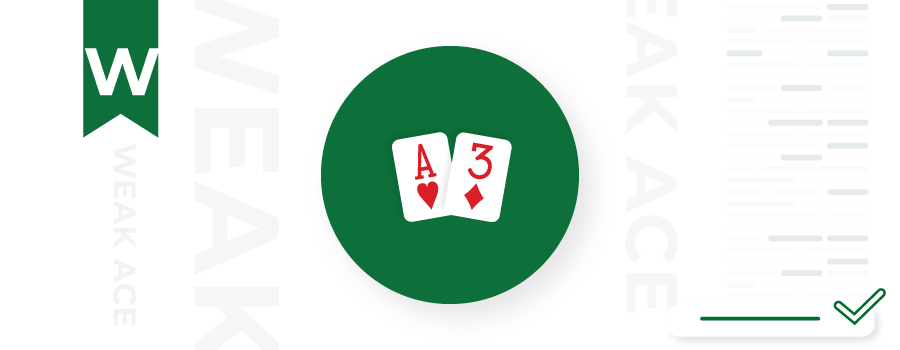
- Wet Board: A board that is likely to have helped a player make a straight or a flush. Jh Td Js is a wet board.
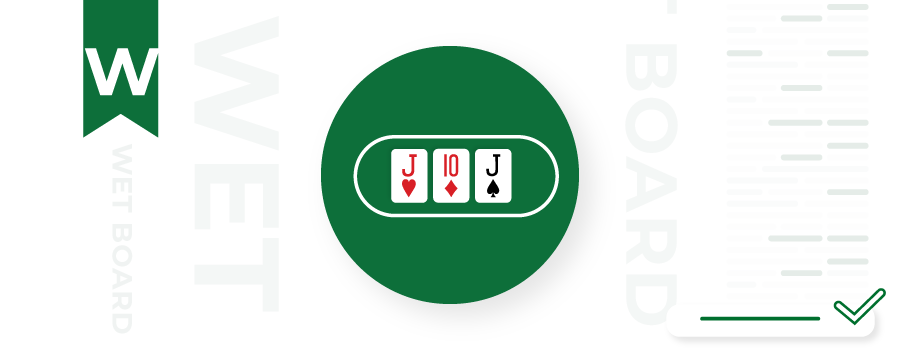
- Whale: The biggest of the big gamblers.
- Wheel: A2345. The lowest possible hand. Also “bicycle” or “bike”.
- Wild Man: An insanely loose and aggressive player.
- “Winner winner chicken dinner”: A humorously hackneyed expression, often said when a player wins a hand.
- Wired: A pocket pair.
- WPT: The World Poker Tour.
- WSOP: The World Series of Poker
X:
- x: Any unknown card, especially when paired with another card. “I gave him a range of any pair and Ax suited.”
Y:
- Younger Hand: (Obsolete) The hand two to the left of the dealer; one to the left of the elder hand. Now commonly called the big blind.
Z:
- Zip: A worthless hand. “I lose. I got zip!”
- Zipperoo: Zip. Nothing. A worthless hand. “I’m pretty sure you win. I have zipperoo.”

Bonuses
Casinos
Games
Academy
News
Shop
NEW Q&A
Sweepstakes





















































